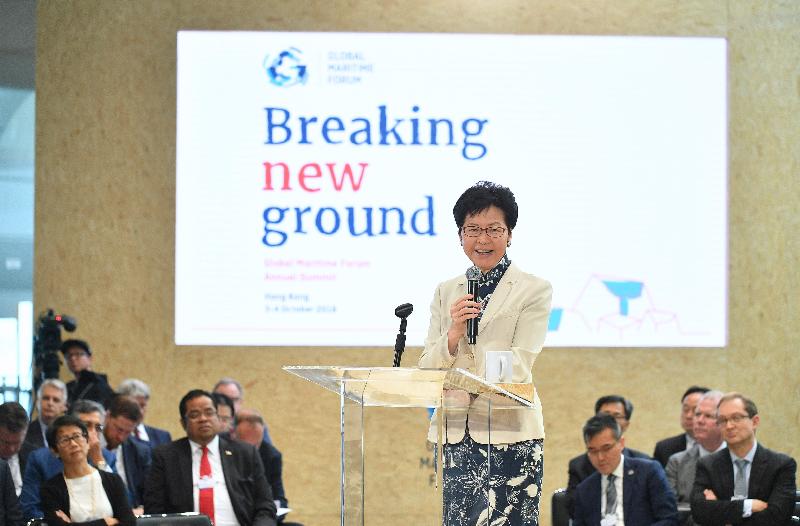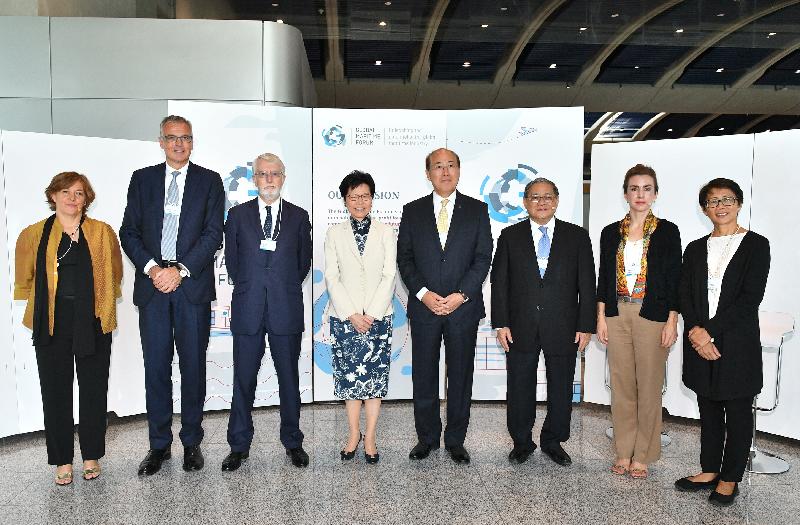Speech by CE at Global Maritime Forum Annual Summit (English only) (with photos/video)
**************************************************************************************
Mr Stokes (Chairman of the Global Maritime Forum, Mr Peter Stokes), Mr Lim (Secretary-General of the International Maritime Organization, Mr Kitack Lim), distinguished guests, ladies and gentlemen,
Good morning. I'm pleased to be here for the annual Summit of the Global Maritime Forum, to have this welcome opportunity to address this distinguished audience, comprising business and institutional leaders with the power, the passion and the vision to make a difference for the great maritime industry and the world.
I understand that this is the first time the Summit has taken place outside of Denmark. I'm delighted you have chosen Hong Kong for your inaugural global maritime gathering. The theme of the Summit is "Breaking New Ground", which makes Hong Kong an ideal place for the Summit as in this term of the HKSAR Government, I have made innovation a key requirement whether in policy formulation or in government roles and practices. To assist us in doing so, I set up earlier this year the Chief Executive's Council of Advisers on Innovation and Strategic Development. And the Council discussed aviation and maritime at its meeting last month. So we do hope to be breaking some new ground in our maritime industry, in order to remain a global force through this 21st century.
The maritime industry is the cornerstone of international trade. More than 80 per cent of global trade by volume is handled by shipping and a great global network of ports. At the same time, the maritime industry is susceptible to external influences, and we've certainly had a few of those so far this year. Of particular concern for many, including Hong Kong, is the sudden spate of trade disputes, most notably between the world's two largest economies, the United States and Mainland China. A protracted trade logjam between them would undoubtedly squeeze cargo flow across seas.
Operating costs are also increasing, partly because of the International Maritime Organization's 2020 sulphur cap. Don't get me wrong - while it will have an impact on the maritime industry, we fully support the initiative given the expected gains in environmental protection. As a matter of fact, in 2015 Hong Kong became the first city in Asia to mandate a fuel-switching requirement for ocean-going vessels. That landmark decision has significantly reduced concentrations of ambient sulphur dioxide in the area welling out from our Kwai Tsing Containers Terminal. And to step up control over marine emissions, we plan to mandate that vessels use 0.5 per cent low-sulphur fuel in Hong Kong waters. If approved by our legislature, the requirement will take effect next year, slashing emissions of sulphur dioxide and particulates from ocean-going vessels here by about 75 per cent and 70 per cent respectively.
More than ever, it's co-operation and partnership at the regional and global levels that will help us overcome external challenges. It is my Government's determination to connect with the world and to look for opportunities to collaborate with other economies. Since taking office in July 2017, I have been to dozens of cities in the Mainland and over 10 countries in Asia and Europe, including port cities such as Marseille, with a clear goal of forging closer ties with our partners, or potential partners, worldwide.
The Hong Kong Maritime and Port Board, chaired by our Secretary for Transport and Housing, Frank Chan, has also visited prominent maritime cities to expand connections and the opportunities they can bring. Last year, in London, the Board signed a Memorandum of Understanding with its UK counterparts, both sides keen to promote their maritime strengths and develop the talent so essential to the industry's future. Next month, Maritime London will be among the international maritime community taking part in the annual Hong Kong Maritime Week, organised by the Board along with our Shipowners Association and Maritime Museum. It's a week overflowing with conferences and seminars, industry briefings, networking events and maritime-themed community activities, all in celebration of our maritime legacy and future.
Next month, as well, the Board will visit Copenhagen and Oslo, and I look forward to establishing stronger maritime connections between Hong Kong and the Nordic nations.
Those connections, and the opportunities we hope to realise from them, will be driven largely by innovation and technology. Automation and digitalisation are transforming the global maritime industry. Automated ships, big data, blockchain, robotics and so on are reshaping the modus operandi of the maritime supply chain.
Take e-commerce as an example. Global retail e-commerce sales reached US$2.3 trillion last year. By 2021, they're projected to more than double, to US$5 trillion. That's great news for the logistics industry, but I also believe that seaborne transportation will have a role to play in this booming trade, particularly with cross-border e-commerce continuing to thrive. And this is where innovation and technology will make their indelible mark.
Decades ago, containers were packed with bundles of products that required additional packaging or value-added services before being put up for sale. These days, containers are filled with ready-for-sale parcels packaged for individual consumers. Container-shipping clients have expanded from large-scale manufacturing companies to numerous small- and medium-sized enterprises. Maritime business must adapt to new business models, offering such smart solutions as digitalised platforms for better shipment tracking and the use of big data in analysing consumer behaviour. At the same time, cyber security and risk allocation must be addressed to protect the interests of all concerned.
Apart from innovation and technology, we need to maintain a continuing wave of fresh talent to manage the expansion of global trade and the world's shipping fleets. It is not an easy task given the demands, both professional and personal, of a career at sea, but I can assure you that my Government is working hard to expand our talent flow. In 2014, for example, we set up the Maritime and Aviation Training Fund. It encourages young people to make their careers in the industries, while enhancing the qualifications and competency of existing professionals.
I note that the great talent challenge will be discussed this afternoon, both in a working session and follow-up breakout sessions. No doubt, that will stimulate ideas on how best to attract and retain promising young talent, as well as how best to ensure a bright future for them and for the industry as a whole.
The opportunities will surely be there, thanks to the far-reaching Belt and Road Initiative. The Belt and Road Initiative has been designed to expand transnational and intercontinental connectivity. It is built to create long-term business prospects, not only for the Mainland but for the economies of Asia, Europe, Africa and even Latin America, particularly those nations situated along the 21st Century Maritime Silk Road. That connectivity embraces infrastructure, policy co-ordination, trade, financial integration and people-to-people bonds. In boosting trade links, increasing capital flow and attracting infrastructural investment, it will catalyse vast opportunities for seaborne trade and maritime services.
As an international maritime centre and global trade and investment hub, Hong Kong has what it takes to be the business bridge between East and West. Located at the heart of Asia and at the doorstep of China, Hong Kong is strategically positioned and supremely well connected to the world's major cities and trade centres. We are situated along the most thriving international sea routes. Our container terminal is one of the world's busiest ports. Our liner services connect to 470 destinations a week, and we maintain sea-cargo operations with 58 countries along the Belt and Road corridor.
Despite Hong Kong's clear strengths, maintaining the competitiveness of our maritime sector remains a formidable challenge. Slightly more than a decade ago, Hong Kong Port was ranked first worldwide in total throughput handled. Last year, it finished fifth, a slide attributable to fierce competition from regional ports coupled with internal constraints in land and manpower supply and international economic uncertainties. To maintain competitiveness, we are pursuing new opportunities, particularly through national developments and initiatives. Together with the Belt and Road, the Guangdong-Hong Kong-Macao Greater Bay Area has the greatest potential. The development brings together Hong Kong, Macao and nine prosperous cities in southern China. With a population of nearly 70 million and an aggregate GDP of about US$1.5 trillion, the Bay Area is a huge market on its own. Further, the Bay Area will take full advantage of each city's unique strengths, consolidating resources and maximising each other's business potential.
While Hong Kong faces fierce competition in cargo trade, we remain highly competitive in professional services. More than 800 companies, from ship finance and leasing, to insurance, ship management, legal and arbitration services, are profitably engaged in the international maritime business here. Many of the world's leading ship brokers keep offices in Hong Kong. So, too, do nearly 90 authorised ship insurers, some 35 of which are foreign insurers.
That's hardly surprising, given Hong Kong's standing as the world's freest economy. A week ago today, Canada's Fraser Institute once again named Hong Kong the freest economy in the world in its annual Economic Freedom of the World report. Earlier this year, the Washington-based Heritage Foundation named Hong Kong the world's freest economy for the 24th year in a row. We are also among the world's most competitive economies, rated second globally in this year's World Competitiveness Yearbook. That's thanks to a low and simple tax regime, a level playing field for business and the rule of law backed by an independent judiciary.
Let me add that the Hong Kong Shipping Register is the fourth largest in the world, with a total of about 120 million gross tonnes. Its reputation for fleet quality is well known worldwide, and that's reflected in our very low detention rate. And our Marine Department continues to enhance our Shipping Registry. Since last year, for example, our overseas and Mainland offices have helped deliver the Certificate of Registry to select maritime cities, expediting the sailing of overseas ships registered in our Shipping Register.
The Belt and Road Initiative and the Bay Area will create surging needs for legal and dispute-resolution expertise as well as other professional services, including investment and risk assessment, research, financing, insurance and accounting. We have all the professionals here in Hong Kong, working with clients from the Mainland and from all over the world. They give Hong Kong our clear competitive edge, providing high value-added services for Mainland companies looking to go out to the world and for a world of companies looking to the booming markets of the Mainland and throughout Asia. To ensure that the world is aware of our business prowess, particularly when it comes to the maritime industry, a dedicated maritime desk has already been set up at Invest Hong Kong to promote Hong Kong's wide-ranging maritime expertise and value, communicating those advantages to overseas and Mainland maritime cities.
You may wonder where is the "new ground" that we intend to break, having listened to me in the last 10 minutes or so. I am afraid this is a timing, not a substance, issue because I will be delivering my annual Policy Address this time next week, and it is not possible for me to disclose whether we have any measures to boost maritime services in Hong Kong.
Ladies and gentlemen, Hong Kong has a proud history of accomplishment as an international maritime centre and global trade hub. With the concerted efforts of Government and industry, and the support of international organisations such as yours, I'm confident that our maritime industry's record of achievement and innovation will continue long into the future.
My thanks again to the Global Maritime Forum for organising the Global Maritime Forum Summit, your first global summit, here in Hong Kong. I wish you all a rewarding Summit, and smooth sailing in the coming year. Thank you.
Ends/Wednesday, October 3, 2018
Issued at HKT 14:40
Issued at HKT 14:40
NNNN




